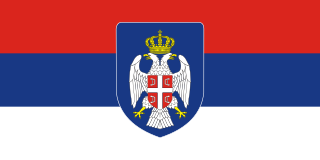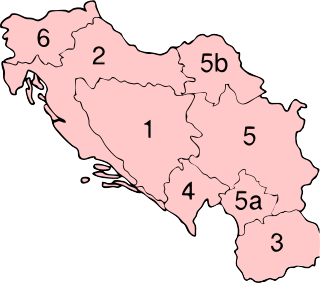
The United Nations Transitional Administration for Eastern Slavonia, Baranja and Western Sirmium (UNTAES) was a UN peacebuilding transitional administration in Eastern Slavonia, Baranja and Western Syrmia, in the eastern parts of Croatia. The transitional administration lasted between 1996 and 1998. The transitional administration was formally established by the United Nations Security Council Resolution 1037 of January 15, 1996. The transitional administration was envisaged and invited in the November 1995 Erdut Agreement between the Croatian Government and the representatives of the local Serb community in the region. At the time of UNTAES deployment the region already hosted another traditional type UN peacekeeping mission known as the UNCRO. While the region was covered under the UNCRO's sector east, the whole UNCRO mission was brought into question by the Operation Storm escalation of hostilities.

The Serbian Autonomous Oblast of Krajina or SAO Krajina was a self-proclaimed Serb Autonomous Region (oblast) within modern-day Croatia. The territory consisted of majority-Serbian municipalities of the Republic of Croatia that declared autonomy in October 1990. It was formed as the SAO Kninska Krajina, but, upon inclusion of additional Serb-populated areas, changed its name simply to SAO Krajina. In 1991 the SAO Krajina declared itself the Republic of Serbian Krajina, and subsequently included the other two Serbian SAOs in Croatia, the SAO Western Slavonia and the SAO Eastern Slavonia, Baranja and Western Syrmia.

The Serbian Autonomous Oblast of Eastern Slavonia, Baranja and Western Syrmia was a self-proclaimed Serbian Autonomous Oblast (SAO) in eastern Croatia, established during the Yugoslav Wars. It was one of three SAOs proclaimed on the territory of Croatia. The oblast included parts of the geographical regions of Slavonia, Baranja, and Syrmia along the Croatian section of the Danube river Podunavlje region.

The United Nations Confidence Restoration Operation in Croatia, commonly abbreviated UNCRO, was a United Nations (UN) peacekeeping mission in Croatia. It was established under Chapter VII of the United Nations Charter and approved by the UN Security Council (UNSC) Resolution 981 on 31 March 1995. UNCRO inherited personnel and infrastructure from the United Nations Protection Force (UNPROFOR). Its command was located in Zagreb; the peacekeeping troops were deployed in four sectors named North, South, East, and West. Twenty different countries contributed troops to the mission.

Mirkovci is a village and suburb of the town of Vinkovci in eastern Croatia. It is geographically within the Syrmia and Podunavlje region. The village is located immediately southeast of Vinkovci separated from the rest of the town by Vinkovci-Gunja railway. At the time of 2011 Census, the local population was 3,283.

Eastern Slavonia, Baranja and Western Syrmia, commonly abbreviated as Eastern Slavonia, was a short-lived Serb parallel entity in the territory of Croatia along the Danube river.

United Nations Security Council resolution 871, adopted unanimously on 4 October 1993, after reaffirming resolutions 713 (1992) and 743 (1992) and subsequent resolutions relating to the situation in the former Yugoslavia and United Nations Protection Force (UNPROFOR), the Council expressed concern that United Nations peacekeeping plan for Croatia, in particular Resolution 769 (1992), had not been implemented and went on to discuss the peace plan and extend UNPROFOR's mandate until 31 March 1994.

United Nations Security Council resolution 981, adopted unanimously on 31 March 1995, after reaffirming all resolutions on the situation in the former Yugoslavia, the council established the United Nations Confidence Restoration Operation in Croatia (UNCRO) for a period terminating 30 November 1995.

United Nations Security Council resolution 994, adopted unanimously on 17 May 1995, after reaffirming all resolutions on the conflicts in the former Yugoslavia, particularly resolutions 981 (1995), 982 (1995) and 990 (1995), the Council discussed the withdrawal of Croatian Army from the zone of separation taken in Operation Flash on May 1st and the full deployment of the United Nations Confidence Restoration Operation in Croatia (UNCRO).

United Nations Security Council resolution 1023, adopted unanimously on 22 November 1995, after recalling all resolutions on the conflicts in the former Yugoslavia, the Council noted the "Basic Agreement on the Region of Eastern Slavonia, Baranja and Western Sirmium" between the Government of Croatia and local Serb representatives.

United Nations Security Council resolution 1037, adopted unanimously on 15 January 1996, after recalling previous resolutions on Croatia including resolutions 1023 (1995) and 1025 (1995), the council established the United Nations Transitional Authority for Eastern Slavonia, Baranja and Western Syrmia (UNTAES) for an initial period of 12 months.

United Nations Security Council resolution 1038, adopted unanimously on 15 January 1996, after recalling previous resolutions on Croatia including resolutions 779 (1992), 981 (1995) and 1025 (1995), the Council authorised the United Nations Mission of Observers in Prevlaka to continue monitoring the demilitarisation in the Prevlaka peninsula area of Croatia.

United Nations Security Council resolution 1043, adopted unanimously on 31 January 1996, after recalling previous resolutions on Croatia including Resolution 1037 (1996) which established the United Nations Transitional Authority for Eastern Slavonia, Baranja and Western Sirmium (UNTAES), the Council authorised the deployment of 100 military observers for an initial period of six months. On 26 January the Secretary General informed the Security Council that the UNTAES mission will need the observers to supervise demilitarization of Eastern Slavonia.

United Nations Security Council resolution 1069, adopted unanimously on 30 July 1996, after recalling previous resolutions on Croatia including Resolution 1037 (1996) which established the United Nations Transitional Authority for Eastern Slavonia, Baranja and Western Sirmium (UNTAES) and Resolution 1043 (1996) authorising the deployment of military observers, the Council extended the deployment of 100 military observers with UNTAES for a further six months until 15 January 1997.

United Nations Security Council resolution 1079, adopted unanimously on 15 November 1996, after recalling previous resolutions on Croatia including 1023 (1995), 1025 (1995), 1037 (1996), 1043 (1996) and 1069 (1996), the Council extended the mandate of the United Nations Transitional Authority for Eastern Slavonia, Baranja and Western Sirmium (UNTAES) until 15 July 1997.

United Nations Security Council resolution 1120, adopted unanimously on 14 July 1997, after recalling previous resolutions on Croatia including 1023 (1995), 1025 (1995), 1037 (1996), 1043 (1996), 1069 (1996) and 1079 (1996), the Council extended the mandate of the United Nations Transitional Authority for Eastern Slavonia, Baranja and Western Sirmium (UNTAES) until 15 January 1998.
United Nations Security Council resolution 1145, adopted unanimously on 19 December 1997, after noting the termination of the mandate of the United Nations Transitional Authority for Eastern Slavonia, Baranja and Western Sirmium on 15 January 1998 in accordance with Resolution 1120 (1997), the Council authorised a support group of 180 civilian police monitors, known as the United Nations Civilian Police Support Group (UNPSG), to observe the situation in eastern Croatia for an additional nine months.

The Erdut Agreement, officially the Basic Agreement on the Region of Eastern Slavonia, Baranja and Western Sirmium, is an agreement reached on 12 November 1995 between the authorities of the Republic of Croatia and the local Serb authorities of the Eastern Slavonia, Baranja and Western Syrmia region on the peaceful resolution to the Croatian War of Independence in eastern Croatia. It effectively ended the ethno-nationalist conflict in the region and initiated the process of peaceful reintegration of the region to central government control of Croatia. The reintegration was directly implemented by the United Nations. The agreement provided a set of guarantees on human and minority rights as well as on the refugee return. It was named after Erdut, the village in which it was signed by local Serb representatives.

OSCE Mission to Croatia was the field mission of the Organization for Security and Co-operation in Europe operating in Croatia in from July 1996 until the December 2007. The Mission become preeminent international organization in Croatia after the departure of UNTAES forces from the Eastern Slavonia, Baranja and Western Syrmia.

The United Nations Civilian Police Support Group (UNPSG) was a United Nations peacekeeping operation monitoring the performance of the Croatian police in the Danube region from 16 January 1998 to 15 October 1998. The mission was active in the same area of the former parallel Eastern Slavonia, Baranja and Western Syrmia which was previously directly governed by the UNTAES transitional administration between 1996 and 1998. The mission took over vehicles, equipment and other support assets from UNTAES. UNPSG was not the first CIVPOL engagement in the region as earlier missions of UNPROFOR, UNCRO and UNTAES all included civilian police components.












